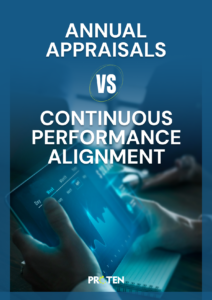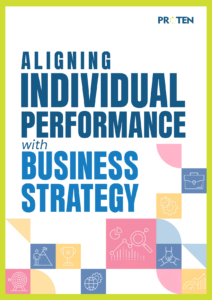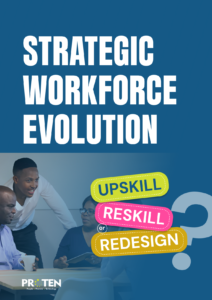For many leaders and people in HR, performance feedback is an underutilized power tool in performance management. When delivered thoughtfully, it can cultivate talent, foster trust and open communication, and solidify the connection between managers and their teams. Speedy feedback even boosts employee performance by up to four times, according to Gallup. Unfortunately, the crucial act of providing feedback is often neglected or even shunned altogether, often in a misguided attempt to avoid discomfort.
At Proten International, a leading consulting agency for HR managers in Nigeria and beyond, we understand more than anyone that without feedback, your employees cannot clearly understand what they are doing right or wrong. We also know this may lead to continuous incompetency in their line of work. So in this article, we’ve provided a couple of expert tips you can use to deliver performance feedback that will get you the outcome you need.
1. Be Specific.
If you intend to offer constructive feedback, then it has to be clear, understandable, and to the point. General comments like “Your work needs to improve” can be quite confusing and leave employees in the dark as to what exactly they need to work on. Research shows that 73% of workers would like their employers to be more clear with their goals and expectations. So you have to be specific on what you want your employer to do and be sure to offer guidance as well. So for example, say you have an employee who delays sending in reports but is good with everything else, instead of saying “You’re not doing so well” thereby confusing them, you could say something like: “I noticed you were late sending in your reports for the last two weeks. I think you might have a time management issue and I would like to walk you through it so you can be better”. This will make your employee understand that their current challenge is sending in reports on time, and they will be open to your help.
It’s also important to know that as much as corrective feedback is appreciated, positive feedback is even more welcome. Employees who receive recognition from management are 69% more likely to do better work. So don’t shy away from positive feedback. Commend your employees on their good work, so they know about what they’re doing right.
2. Make Sure Your Advice is Requested.
This might sound a bit controversial, given that you’re an employer or HR manager. It is in your place to give “needed” feedback to employees, right? Well yes, and at the same time, not really. The thing is, you might think you’re giving expert feedback, but it might not be needed at the moment. Gallup agrees with this statement, with research stating that only a third of people believe that the feedback they receive is helpful. That’s because, more often than not, it’s unsolicited and can bring stress to the person receiving it.
Except when it is needed, perhaps in the case of an urgent need for performance improvement, You should be sure to ask them if, when, and how they would like to be given feedback. This way, the chances of a positive reaction to your feedback increase, and your employees don’t get stressed from information overload. Empower your people to control their feedback by helping them feel confident and comfortable enough to ask for it.
3. Don’t Abandon Empathy
The end goal of effective performance feedback is to unlock your employee’s full potential by getting them motivated. For this to be achieved, you need to be willing to step into the shoes of your employees. This means understanding their workload, personal challenges, and learning style. This shift in perspective, as championed by HR guru Laurie Bassi, allows for feedback that feels supportive and growth-oriented. Bassi emphasizes, “Without empathy, feedback can feel like a personal attack, shutting down any chance of improvement.” By acknowledging the human element and tailoring your approach, your feedback agenda becomes more collaborative. Employees who feel heard and understood are more receptive to constructive criticism and more invested in implementing change. This fosters a culture of trust and psychological safety, where mistakes are seen as learning opportunities, not roadblocks to success. Ultimately, empathy empowers you, the HR manager, to deliver feedback that resonates, motivates, and propels your employees and, consequently, the entire organization, forward.
4. Don’t Wait Till The End Of the Quarter.
The best time for performance feedback is immediately after an occurrence, as reported by Schematic Scholar. Be it positive or negative, weekly feedback is the best way to peak employee engagement. If an issue is left unaddressed, it may increase by the time you want to conduct a quarterly appraisal, making it even more difficult to handle. You’d end up facing a wall of issues that could have been confronted earlier.
Also, in the process of saving issues for the performance appraisal, they might be forgotten, and valuable time that could have been spent addressing those issues would have passed. In some cases, you might find that any advice you would want to give turns out to be unrequested, as discussed in point 2.
5. Keep it Private
When giving performance feedback, there should be a balance between constructive criticism and privacy. While transparency and open communication are crucial for fostering trust and growth, there’s a fine line between offering valuable insights and potentially sensitive details. As an HR professional, you navigate this tightrope walk, ensuring feedback fosters development without dismissing your employee’s confidentiality.
According to Susan Meisinger, CEO of Talent Culture, “Employees crave feedback, but they also crave respect for their privacy. The key is to find the sweet spot where you can deliver honest, specific feedback while still protecting the employee’s sense of self.” This sweet spot lies in focusing on the behavior or action at hand, rather than personal characteristics. For instance, instead of saying, “You’re just not a detail-oriented person,” highlight a specific instance: “In this project, some deadlines were missed due to incomplete data. Let’s discuss some ways to ensure all information is gathered beforehand.” This approach tackles the issue head-on while maintaining confidentiality.
Furthermore, as an HR manager, you play a pivotal role in establishing clear guidelines and expectations around feedback. This could include outlining acceptable formats (e.g., one-on-one meetings, and progress reports) and ensuring all feedback conversations are documented for future reference (while still maintaining appropriate privacy controls). By creating a framework that prioritizes both growth and privacy, you won’t only deliver effective feedback but also foster a culture where employees feel comfortable receiving and acting upon it.
6. Get Ready for Your Feedback
You read that right. In the process of performance feedback, you’re not the only one who’s going to have something to say. It’s important that you also ask if they have something to say. There may be causative factors affecting your employees’ performance, and lecturing them about how to improve without finding a root cause is like talking to a brick wall. When talking about sensitive subjects, remember that respect is a crucial component. Additionally, it is much more productive to engage in discussion with someone rather than speak to them. Effective feedback is a conversation, not a lecture. By inviting the employee’s perspective, you gain valuable insights into their understanding of their role, the challenges they face, and their aspirations for growth. This two-way dialogue fosters a sense of ownership and accountability in the employee. They become active participants in charting their development journey, rather than passive recipients of pronouncements. This collaborative approach also strengthens trust and psychological safety within the team. When employees feel comfortable offering their perspectives, even if it’s to disagree with a point or raise concerns, it opens the door to a more honest and transparent dialogue. This, in turn, fosters a sense of mutual respect and a willingness to learn from each other.
7. Make Sure You Follow Up
Companies that implement continuous performance feedback are 39% more effective at attracting talent and 44% better at talent retention than companies that don’t. This isn’t simply a matter of checking in on a box. Effective follow-up fosters a sense of accountability and propels development forward. It allows employees to ask clarifying questions, discuss any anxieties they might have around their goals, and brainstorm strategies for success.
As an HR manager, the follow-up conversation presents an opportunity for you to champion employee development. By scheduling check-ins throughout the review period, you can offer ongoing support and address any roadblocks your employees encounter. This demonstrates a genuine commitment to their growth and strengthens the trust between the employee and your organization. Furthermore, it allows you to identify any broader training needs or systemic challenges that might be hindering overall performance.
Ultimately, the follow-up conversation transforms the review from a singular event into a springboard for continuous improvement. It empowers your employees to take ownership of their professional journey and fosters a culture of learning and development within the organization.
In Conclusion…
Remember, you need to always give feedback. Without it, your employees won’t know if they’re getting their work right or wrong. As an employer or HR manager, performance feedback isn’t supposed to be a challenge. You just need to know how to get it right. By following each of the steps above, you can be well on your way to delivering the performance feedback that will get you the outcome you need.
Performance feedback is just one of the numerous jobs you have to carry out as an HR manager. With so many tasks at hand, it might be hard for you to keep track of everything and manage your time effectively. Our piece on effective time management provides insight into how to schedule your tasks effectively so you can meet your deadlines on time and create an effective work-life balance for yourself.











